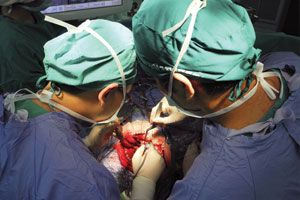TEACHING trainee surgeons how to deal with interruptions and distractions during operations can never be codified, according to one of Australia’s leading surgeons.
Professor Bruce Barraclough, the Royal Australasian College of Surgeons’ dean of education, said there were multiple variables in the way interruptions and distractions happened and how people dealt with them, making it impossible to include such variables in formal training.
Trainee surgeons encountered distractions and interruptions from their first operation and developed their own ways to deal with them through experience and observation of senior surgeons, Professor Barraclough said.
He was commenting on research published in the Archives of Surgery, which found operating room distractions and interruptions had the potential to cause operative errors by surgical trainees. (1)
The research involved second-, third- and research-year trainees, aged 27–35 years, who were purposely distracted while using an advanced virtual reality surgical simulator to perform a laparoscopic cholecystectomy.
Four distractions and two interruptions were used in the experiment. The distractions included a ringing phone answered by an observer and a dropped metal tray, while the interruptions were a question about how to treat a previous patient in the recovery room and a question unrelated to the surgical procedure asking why they had chosen this profession.
The trainee surgeons made major surgical errors in eight of 18 simulated procedures (44%) with distractions and interruptions, and only in one of 18 (6%) control procedures. This difference was significant, particularly in relation to interruptions.
The interruption associated with the highest number of errors was the question related to appropriate treatment for the patient in recovery.
In a second outcome measure testing prospective memory — an instruction to announce that the procedure was about three-quarters complete as the gallbladder was separated from the liver — 56% of those interrupted/distracted forgot to make the announcement compared with 22% in the control group.
The study authors said one of the most striking findings was the prevalence of errors that occurred when participants were distracted and interrupted after 1 pm. They hypothesised that the trainees did not have enough cognitive resources to simultaneously deal with the interruptions/distractions, as if the interruptions/distractions “put them over the edge after 1 pm”.
“One possible reason for this time of day effect was fatigue, as suggested in research that indicates fatigued task performers are less resistant to the adverse effects of distractions and interruptions”, the authors wrote.
They said it was important to note that the interruptions and distractions in the experiment were timed to occur at critical points and occurred more frequently than would normally be observed in an operating room.
Professor Barraclough said although the study gives good information about the consequences of distractions/interruptions, he was “not at all surprised” by the results.
“Slips, lapses and mistakes are never going to be eliminated”, Professor Barraclough said. “But it is the people who can recover best from these adverse actions who can do the best for the patient — they recognise the problem and fix it.”
He said as all operations involved at least 3‒4 people in the operating room, distractions and interruptions were inevitable and all surgeons developed their own ways of dealing with them.
“Reflecting on my 30 years of surgery, interruptions are common during operations and all of us develop mechanisms to screen [them] out so we can focus”, he said.
Professor Barraclough cited the worst interruption for a surgeon as being told by a hospital employee that “if you don’t hurry up we will cancel your last surgery”.
“It’s those sorts of things that cause the worst distraction as you know you then have to spend a lot of time rescheduling operations. It just amplifies an already stressful job.”
– Kath Ryan
1. Arch Surg 2012; Online 16 July
Posted 23 July 2012

 more_vert
more_vert